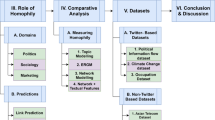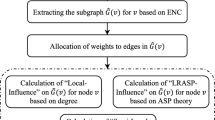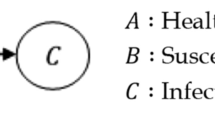Abstract
Although centrality is widely used to differentiate the importance of nodes for social-aware routing in mobile opportunistic networks (MONs), it is destination-agnostic since such metrics are usually measured without destination information. To this end, we propose a destination-aware social routing scheme for MONs, namely DAS, which utilizes the destination-aware betweenness centrality (DBC) to choose the right nodes as relays given the specific destination node. During the process of message dissemination, the number of replicas for a message is calculated by the source and each relay independently in respond to the network condition in a dynamic manner. Therefore, DAS disseminates only a few message copies to ensure data delivery as well as reducing routing cost. We conduct extensive simulations using real trace data sets to show improved performance with low overhead in comparison with existing social-aware routing approaches in various scenarios.






Similar content being viewed by others
References
Hu, X., Chu, T. H. S., Leung, V. C. M., Ngai, E. C.-H., Kruchten, P., & Chan, H. C. B. (2015). A survey on mobile social networks: Applications, platforms, system architectures, and future research directions. IEEE Communications Surveys & Tutorials, 17(3), 1557–1581.
Daly, E. M., & Haahr, M. (2007). Social network analysis for routing in disconnected delay-tolerant MANETs. In Proceedings of MobiHoc, Montreal, QC, Canada (pp. 32–40).
Hui, P., Crowcroft, J., & Yoneki, E. (2008). BUBBLE rap: Social-based forwarding in delay tolerant networks. In Proceedings of MobiHoc, Hong Kong SAR, China (pp. 241–250).
Bulut, E., & Szymanski, B. K. (2010). Friendship based routing in delay tolerant mobile social networks. In Proceedings of GLOBECOM, Miami, FL, USA.
Liben-Nowell, D., Novak, J., Kumar, R., Raghavan, P., & Tomkins, A. (2005). Geographic routing in social networks. PNAS, 102, 11623.
Newman, M. E. J. (2002). The spread of epidemic disease on networks. Physical Review E, 66, 016128.
Lindgren, A., Doria, A., & Scheln, O. (2003). Probabilistic routing in intermittently connected networks. ACM SIGMOBILE Mobile Computing and Communications Review, 7(3), 19–20.
Spyropoulos, T., Psounis, K., & Raghavendra, C. S. (2005). Spray and wait: An efficient routing scheme for intermittently connected mobile networks. In Proceedings of ACM SIGCOMM workshop: Conference on computer communications, Philadelphia, PA, USA (pp. 252–259).
Burgess, J., Gallagher, B., & Jensen, D. (2006). MaxProp: Routing for vehicle-based disruption-tolerant networks. In Proceedings of INFOCOM, Barcelona, Spain (pp. 1–11).
Spyropoulos, T., Psounis, K., & Raghavendra, C. S. (2008). Efficient routing in intermittently connected mobile networks the single-copy case. IEEE/ACM Transactions on Networking, 16(1), 63–76.
Zhu, Y., Xu, B., Shi, X., & Wang, Y. (2013). A survey of social-based routing in delay tolerant networks: Positive and negative social effects. IEEE Communications Surveys & Tutorials, 15(1), 387–401.
Wei, K., Liang, X., & Xu, K. (2014). A survey of social-aware routing protocols in delay tolerant networks: Applications, taxonomy and design-related issues. IEEE Communications Surveys & Tutorials, 16(1), 556–578.
Hui, P., Chaintreau, A., Scott, J., Gass, R., Crowcroft, J., & Diot, C. (2005). Pocket switched networks and human mobility in conference environments. In Proceedings of WDTN, Philadelphia, PA, USA (pp. 244–251).
Link, J. A. B., Viol, N., Goliath, A., & Wehrle, K. (2009). SimBetAge: Utilizing temporal changes in social networks for pocket switched networks. In Proceedings of U-NET, Rome, Italy (pp. 13–18).
Mtibaa, A., May, M., Diot, C., & Ammar, M. (2010). PeopleRank: Social opportunistic forwarding. In Proceedings of INFOCOM.
Socievole, A., Yoneki, E., Rango, F. D., & Crowcroft, J. (2015). Ml-sor: Message routing using multi-layer social networks in opportunistic communications. Computer Networks, 81, 201–219.
Scott, J., Hui, P., Crowcroft, J., & Diot, C. (2006). Haggle: A networking architecture designed around mobile users. In Proceedings of IFIP WONS.
Bulut, E., Wang, Z., & Szymanski, B. K. (2009). Impact of social networks on delay tolerant routing. In Proceedings of GlobalCom, Honolulu, HI, USA.
Li, F., & Wu, J. (2009). LocalCom: A community-based epidemic forwarding scheme in disruption-tolerant networks. In Proceedings of SECON, Rome, Italy.
Wu, J., Xiao, M., & Huang, L. (2013). Homing spread: Community home-based multi-copy routing in mobile social networks. In Proceedings of INFOCOM.
Ciobanu, R. I., Marin, R. C., Dobre, C., & Cristea, V. (2015). Interest-awareness in data dissemination for opportunistic networks. Ad Hoc Networks, 25(Part B), 330–345.
Karaliopoulos, M. (2009). Assessing the vulnerability of DTN data relaying schemes to node selfishness. IEEE Communications Letters, 13(12), 923–925.
Li, Q., Zhu, S., & Cao, G. (2010). Routing in socially selfish delay tolerant networks. In Proceedings of INFOCOM, San Diego, USA.
Li, Y., Hui, P., Jin, D., Su, L., & Zeng, L. (2010). Evaluating the impact of social selfishness on the epidemic routing in delay tolerant networks. IEEE Communications Letters, 14(11), 1026–1028.
Lu, R., Lin, X., Zhu, H., Shen, X., & Preiss, B. (2010). Pi: A practical incentive protocol for delay tolerant networks. IEEE Transactions on Wireless Communications, 9(4), 1483–1493.
Mtibaa, A., & Harras, K. A. (2013). Fairness-related challenges in mobile opportunistic networking. Computer Networks, 57, 228–242.
Zhou, T., Choudhury, R. R., & Chakrabarty, K. (2009). Diverse routing: Exploiting social behavior for routing in delay-tolerant networks. In Proceedings of SocialCom, Vancouver, BC, Canada (pp. 1115-1122).
Chen, K., & Shen, H. (2012). SMART: Lightweight distributed social map based routing in delay tolerant networks. In Proceedings of IEEE ICNP.
Rango, F. D., Socievole, A., & Marano, S. (2015). Exploiting online and offline activity-based metrics for opportunistic forwarding. Wireless Networks, 21(4), 1163–1179.
Karaliopoulos, M., Pantazopoulos, P., Jaho, E., & Stavrakakis, I. (2011). Trace-driven analysis of data forwarding in opportunistic networks. In Proceedings of 2nd conference on the analysis of mobile phone datasets and networks, Boston, USA.
Wen, S., Jiang, J., Xiang, Y., Yu, S., & Zhou, W. (2014). Are the popular users always important for information dissemination in online social networks. IEEE Network, 28(5), 64–67.
Pantazopoulos, P., Stavrakakis, I., Passarella, A., & Conti, M. (2010). Efficient social-aware content placement for opportunistic networks. In Proceedings of IFIP/IEEE WONS, Kranjska Gora, Slovenia.
Magaia, N., Francisco, A. P., Pereira, P., & Correia, M. (2015). Betweenness centrality in delay tolerant networks: A survey. Ad Hoc Networks, 33, 284–305.
Everetta, M., & Borgattib, S. P. (2005). Ego network betweenness. Social Networks, 27(1), 31–38.
Keränen, A., Ott, J., Kärkkäinen, T. (2009). The ONE simulator for DTN protocol evaluation. In Proceedings of SIMUTools, Rome, Italy.
Author information
Authors and Affiliations
Corresponding authors
Additional information
Supported by the National Science Foundation of China under Grant Nos. U1504614, 61402343, U1304611 and U1404606.
Rights and permissions
About this article
Cite this article
Zhang, J., Huang, H., Yang, C. et al. Destination-aware metric based social routing for mobile opportunistic networks. Wireless Netw 28, 1301–1312 (2022). https://doi.org/10.1007/s11276-018-01907-2
Published:
Issue Date:
DOI: https://doi.org/10.1007/s11276-018-01907-2




